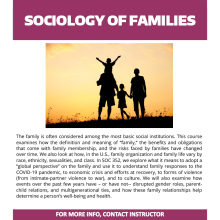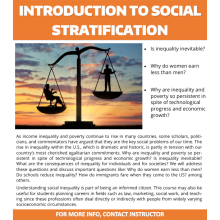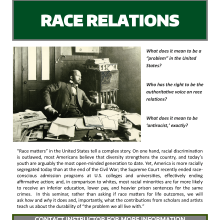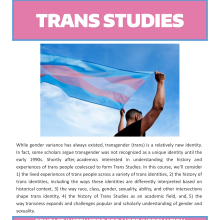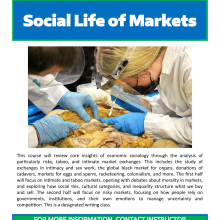SPRING 2024
SOC 352 SOCIOLOGY OF FAMILIES, Julie Brines, 5 CREDITS, (SSc) M/W 10:30 AM-12:20 PM
The family is often considered among the most basic social institutions. This course examines how the definition and meaning of “family,” the benefits and obligations that come with family membership, and the risks faced by families have changed over time. We also look at how, in the U.S., family organization and family life vary by race, ethnicity, sexualities, and class. In SOC 352, we explore what it means to adopt a “global perspective” on the family and use it to understand family responses to the COVID-19 pandemic, to economic crisis and efforts at recovery, to forms of violence (from intimate-partner violence to war), and to culture. We will also examine how events over the past few years have – or have not-- disrupted gender roles, parentchild relations, and multigenerational ties, and how these family relationships help determine a person’s well-being and health. For more information, contact the course instructor Julie Brines brines@uw.edu
SOC 360 INTRO TO SOCIAL STRATIFICATION, Peter Catron, 5 CREDITS (DIV, SSc), T/Th 2:30 PM-4:20 PM
As income inequality and poverty continue to rise in many countries, some scholars, politicians, and commentators have argued that they are the key social problems of our time. The rise in inequality in the U.S., which is dramatic and historic, is partly in tension with our country's most cherished egalitarian commitments. Why are inequality and poverty so persistent in spite of technological progress and economic growth? Is inequality inevitable? What are the consequences of inequality for individuals and for societies? We will address these questions and discuss important questions like: Why do women earn less than men? Do schools reduce inequality? How do immigrants fare when they come to the U.S.? among others.
Understanding social inequality is part of being an informed citizen. This course may also be useful for students planning careers in law, marketing, social work, and teaching since these professions often deal directly or indirectly with people from widely varying socioeconomic circumstances. For more information, contact instructor Peter Catron catron@uw.edu
SOC 362 RACE RELATIONS, Jelani Ince, 5 CREDITS, (DIV, SSc) M/W 10:30 AM-12:20 PM
“Race matters” in the United States tell a complex story. On one hand, racial discrimination is outlawed, most Americans believe that diversity strengthens the country, and today’s youth are arguably the most open-minded generation to date. Yet, America is more racially segregated today than at the end of the Civil War; the Supreme Court recently ended raceconscious admission programs at U.S. colleges and universities, effectively ending affirmative action; and, in comparison to whites, most racial minorities are far more likely to receive an inferior education, lower pay, and heavier prison sentences for the same crimes. In this seminar, rather than asking if race matters for life outcomes, we will ask how and why it does and, importantly, what the contributions from scholars and artists teach us about the durability of “the problem we all live with.” For more information, contact the course instructor Jelani Ince at jinc@uw.edu
SOC 401 B TRANS STUDIES, Rosalind Kichler, 5 CREDITS, (SSc) T/Th 3:30 PM-5:20 PM
While gender variance has always existed, transgender (trans) is a relatively new identity. In fact, some scholars argue transgender was not recognized as a unique identity until the early 1990s. Shortly after, academics interested in understanding the history and experiences of trans people coalesced to form Trans Studies. In this course, we’ll consider 1) the lived experiences of trans people across a variety of trans identities, 2) the history of trans identities, including the ways these identities are differently interpreted based on historical context, 3) the way race, class, gender, sexuality, ability, and other intersections shape trans identity, 4) the history of Trans Studies as an academic field, and, 5) the way transness expands and challenges popular and scholarly understanding of gender and sexuality. For more information, contact the course instructor Rosalind Kichler rkichler@uw.edu
SOC 401 C SOCIAL LIFE OF MARKETS, Sarah Quinn, 5 CREDITS, (SSc) M/W 8:30 AM-10:20 AM
This course will review core insights of economic sociology through the analysis of particularly risky, taboo, and intimate market exchanges. This includes the study of exchanges in intimacy and sex work, the global black market for organs, donations of cadavers, markets for eggs and sperm, racketeering, colonialism, and more. The first half will focus on intimate and taboo markets, opening with debates about morality in markets, and exploring how social ties, cultural categories, and inequality structure what we buy and sell. The second half will focus on risky markets, focusing on how people rely on governments, institutions, and their own emotions to manage uncertainty and competition. This is a designated writing class. For more information, contact the course instructor Sarah Quinn slquinn@uw.edu
